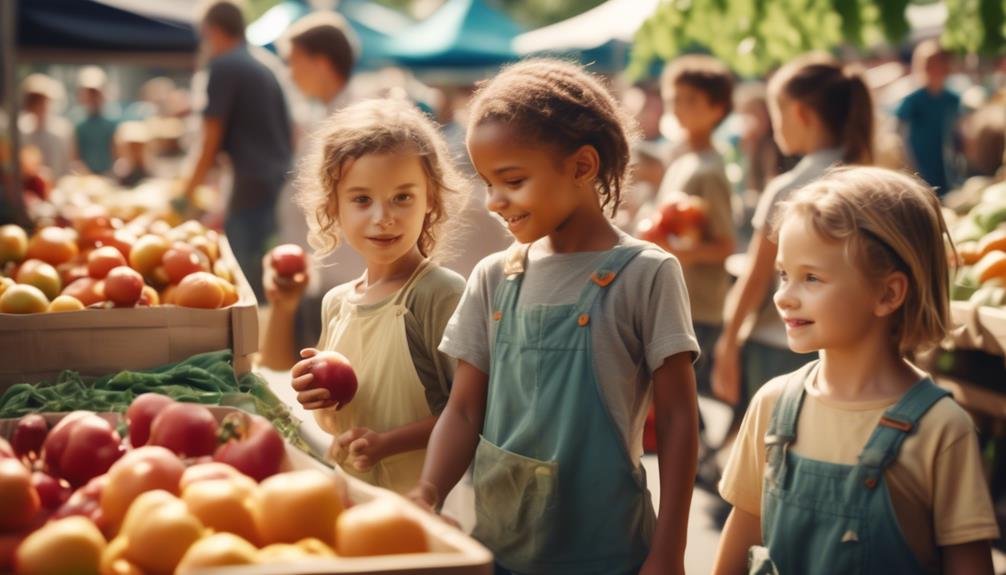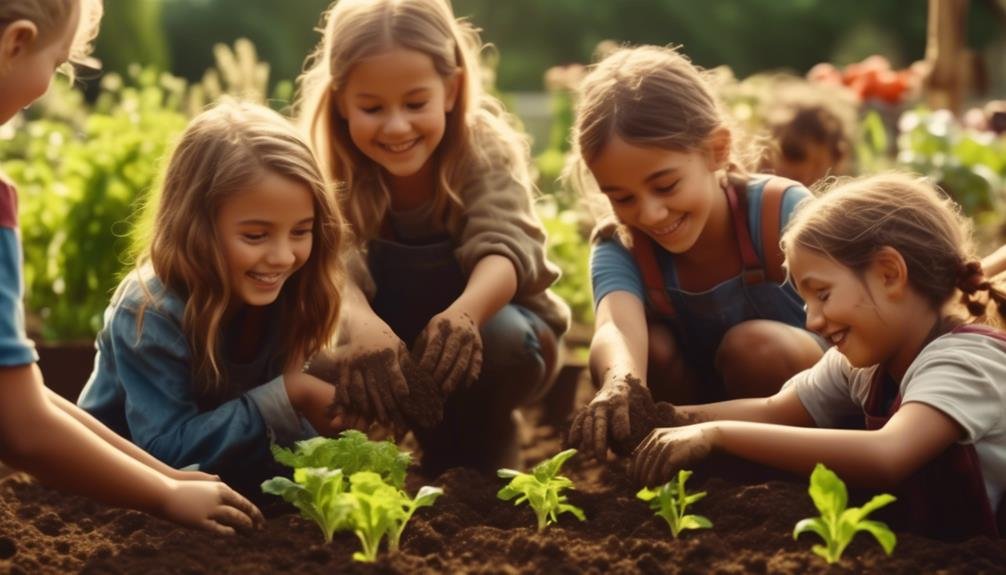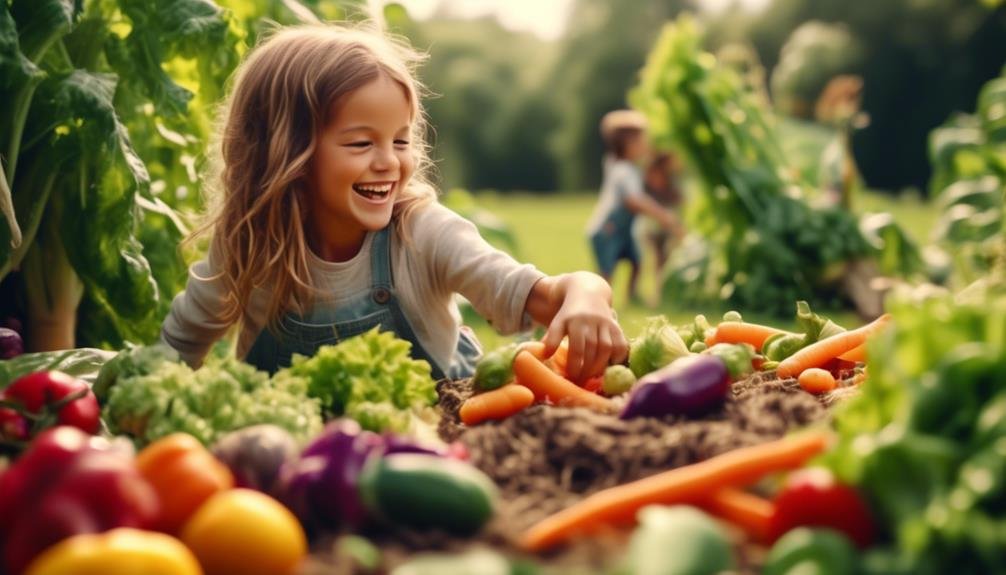"Cherishing Little Steps - A Haven for Baby and Family Journeys"
Farm to Table for Kids
Are you skeptical about introducing farm to table education to your kids? You may be thinking that it's just another passing trend or that your children won't be interested in learning about where their food comes from.
However, there are numerous benefits to exposing kids to the farm to table movement that are worth considering. From fostering a connection with nature to promoting healthy eating habits, the impact of farm to table education on children's lives is truly remarkable.
So, why not give it a chance and discover the exciting possibilities that await your little ones?
Key Takeaways
- Farm to table education helps children make healthier choices and appreciate the work of farmers.
- Teaching kids about seasonal eating encourages them to enjoy the freshest and most flavorful produce in season while reducing their carbon footprint.
- Engaging kids in gardening and farming activities allows them to learn about the importance of soil, sunlight, and water for plant growth, as well as the role of insects and animals in pollination and pest control.
- Supporting local farmers and communities through buying fresh and nutritious food directly from them helps contribute to environmental protection, promote food security, and create jobs in the community.
The Importance of Farm to Table Education

Learning about where our food comes from is so important because it helps us make healthier choices and appreciate the hard work of farmers who grow our food. Farm to table education is a great way to learn about how our food is grown and to understand the benefits of eating fresh, locally sourced ingredients.
One of the benefits of farm to table education is that it teaches us about the importance of eating a variety of fruits and vegetables. When we visit a farm or participate in a farm to table program, we get to see firsthand how different crops are grown and harvested. This knowledge can inspire us to try new foods and incorporate more fruits and vegetables into our diets.
Another benefit of farm to table education is that it helps us understand the impact our food choices have on the environment. By learning about sustainable farming practices, we can make more informed decisions about the types of foods we eat and how they're produced. For example, we can choose to support local farmers who use organic and pesticide-free methods, which can be better for both our health and the planet.
Incorporating farm to table principles at home is also a great way to make healthier choices. We can start by shopping at farmers markets or joining a community-supported agriculture (CSA) program, where we receive a weekly box of fresh, seasonal produce directly from local farms. We can also try growing our own fruits and vegetables in a backyard garden or even in containers on a balcony or windowsill. This way, we've control over how our food is grown and can enjoy the satisfaction of eating something we've nurtured from seed to plate.
Exploring Sustainable Agriculture With Kids
Now, let's dig deeper into the fascinating world of sustainable agriculture and discover how it can be an exciting adventure for you and your friends! Sustainable farming techniques are all about finding ways to grow food while taking care of the environment. It's like a puzzle where you have to find the perfect balance between growing delicious fruits and vegetables and protecting the earth.
One way to explore sustainable agriculture is by going on farm visits. You can visit local farms and see firsthand how they use sustainable practices. You might learn about composting, where leftover food scraps and plant materials are turned into nutrient-rich soil. Or maybe you'll see how farmers use natural pest control methods, like attracting beneficial insects that eat harmful bugs.
During your farm visits, you can also learn about the importance of crop rotation. Farmers often rotate the types of plants they grow in their fields to keep the soil healthy and prevent pests from taking over. This helps to maintain the soil's nutrients and keeps the plants strong and healthy.
Exploring sustainable agriculture isn't only educational but also a lot of fun. You and your friends can see the animals, learn about different crops, and even try some farm-fresh produce. So grab your boots and get ready for an adventure in sustainable farming!
Supporting Local Farmers and Communities

When you support local farmers and communities, you become a superhero for both the environment and your neighborhood! By buying food from local farmers, you are helping to support the local economy and promote food security. Let's take a closer look at how supporting local farmers benefits everyone.
| Supporting Local Farmers | Benefits for You and Your Community |
|---|---|
| 1. Fresh and Nutritious Food | When you buy food from local farmers, you are getting fresh and nutritious produce. Local farmers often grow their food without using harmful chemicals, making it healthier for you and the environment. |
| 2. Supporting the Local Economy | By buying from local farmers, you are helping to keep money within your community. This supports local businesses and helps create jobs for people in your neighborhood. |
| 3. Protecting the Environment | Local farmers often use sustainable farming practices that are better for the environment. They may use organic fertilizers, conserve water, and reduce pollution. This helps to protect our planet for future generations. |
| 4. Promoting Food Security | When you support local farmers, you are helping to ensure that there is a steady supply of fresh food in your community. This is especially important during times of crisis when food supply chains may be disrupted. |
Teaching Kids About Seasonal Eating
Get ready to discover the amazing world of seasonal eating and how it can benefit both your body and the environment! Have you ever wondered why fruits and vegetables taste better at certain times of the year? Well, that's because they're in season! Seasonal produce benefits us and the planet in many ways.
When we eat foods that are in season, we get to enjoy them at their freshest and most flavorful. Just think about biting into a juicy watermelon on a hot summer day or enjoying a crisp apple in the fall. These fruits are bursting with flavor because they're grown and harvested at the perfect time. Plus, seasonal fruits and vegetables are packed with nutrients that our bodies need to stay healthy.
But seasonal eating isn't just good for us. It's also good for the environment. When we eat foods that are in season, they don't have to travel long distances to reach our plates. This means fewer emissions from transportation and a smaller carbon footprint. Plus, supporting local farmers who grow seasonal produce helps our communities thrive.
Engaging Kids in Gardening and Farming Activities

Ready to dig in and get your hands dirty? Let's explore the exciting world of gardening and farming activities that won't only teach you about where your food comes from but also give you the satisfaction of growing your own delicious fruits and vegetables! Nature exploration and outdoor learning are fantastic ways to connect with the environment around you, and gardening and farming activities provide the perfect opportunity to do just that.
Gardening is like having a little piece of nature right in your backyard. You can start by planting seeds in pots or even in a small garden bed. Watch as your plants sprout, grow, and eventually bear fruits and vegetables that you can enjoy. It's a magical journey to witness the transformation from seed to food on your plate.
But gardening isn't just about planting and harvesting. There's so much to learn along the way. You'll discover the importance of soil, sunlight, and water for plant growth. You'll observe the different stages of a plant's life cycle, from germination to flowering and fruiting. And you'll also learn about the insects and animals that play a vital role in pollination and pest control.
Gardening and farming activities offer endless opportunities for hands-on learning. You can create a sensory garden by growing plants with different textures, colors, and scents. You can design your own mini-farm and learn about crop rotation and companion planting. You can even explore the concept of sustainable farming by composting food scraps and using organic pest control methods.
Fun Farm to Table Recipes for Kids
Let's dive into some exciting and delicious farm to table recipes that will make your taste buds dance with delight! Cooking with fresh ingredients from the farm isn't only healthy, but also a lot of fun. Get ready to unleash your inner chef and try out these kid-friendly farm to table recipes!
- Veggie Pizza: Use farm fresh vegetables like tomatoes, bell peppers, and mushrooms to top a homemade pizza crust. Get creative and make funny faces or patterns with the veggies!
- Berry Parfait: Layer farm fresh berries with yogurt and granola to create a colorful and tasty treat. It's like eating a rainbow in a cup!
- Zucchini Noodles: Swap regular pasta for zucchini noodles using a spiralizer. Top it with a homemade tomato sauce using fresh tomatoes, garlic, and basil from the farm.
- Carrot Muffins: Grate fresh carrots and mix them into a muffin batter. Add a touch of cinnamon for a delicious and nutritious snack.
- Fruit Kabobs: Skewer farm fresh fruits like strawberries, pineapple, and melon. It's a fun way to eat your fruits and make your own fruity creations!
These are just a few creative ways to incorporate farm fresh ingredients into your meals. So put on your apron, gather your ingredients, and get ready to enjoy some delicious farm to table dishes!
Cultivating a Lifelong Love for Healthy Eating

Cultivating a lifelong love for healthy eating starts with exploring the vibrant and delicious world of farm-fresh ingredients. By encouraging adventurous eating and incorporating farm to table principles into the school curriculum, you can learn to appreciate the benefits of eating fresh, nutritious foods.
Here are five ways to develop a lifelong love for healthy eating:
- Discover new flavors: Try different fruits and vegetables from the farm to table. Explore the colors, textures, and tastes of fresh produce. Who knows, you might find your new favorite food!
- Grow your own food: Plant seeds and watch them grow into tasty vegetables. You'll feel a sense of pride and joy when you harvest and eat the fruits of your labor.
- Cook together: Involve your family in preparing meals using farm-fresh ingredients. Cooking is a fun way to bond with loved ones and learn new recipes.
- Visit local farms and farmers markets: Take field trips to nearby farms and farmers markets to see where your food comes from. Meet the farmers, ask questions, and learn about sustainable farming practices.
- Start a school garden: Work with your teachers and classmates to create a garden at school. You'll learn about teamwork, responsibility, and the joy of growing and eating your own food.
With these exciting experiences, you'll develop a lifelong love for healthy eating and a deeper connection to the food you eat.
Frequently Asked Questions
How Can Farm to Table Education Benefit Children's Overall Health and Well-Being?
Farm to table education can benefit your overall health and well-being. By learning about where your food comes from and how it's grown, you can make healthier choices and have a better understanding of nutrition.
What Are Some Practical Ways to Incorporate Sustainable Agriculture Into Children's Daily Lives?
You can make sustainability a part of your daily life by teaching kids about farm to table activities. It's fun and helps them understand where their food comes from.
How Does Supporting Local Farmers and Communities Contribute to the Farm to Table Movement?
Supporting local farmers and communities is key to the farm to table movement. When you buy food from them, you're not only getting fresh and delicious produce, but also helping your community thrive. It's a win-win!
What Are Some Strategies for Teaching Children About the Importance of Eating Seasonally?
To teach kids about eating seasonally, you can start by exploring different fruits and veggies that are in season. Then, involve them in grocery shopping and cooking. It's a fun way to learn and appreciate the importance of eating fresh, local produce.
How Can Parents Engage Their Children in Gardening and Farming Activities, Even if They Live in Urban Areas?
You can engage your kids in gardening and farming activities, even if you live in the city. Urban gardening tips and fun farming activities for kids can help them learn about where their food comes from and the importance of sustainable living.
Conclusion
So, my young farmers, remember that the journey from farm to table is like a magical adventure!
By learning about sustainable agriculture, supporting local farmers, and eating seasonally, you're helping to create a healthier and happier world.
And don't forget to get your hands dirty in the garden, where you can grow your own delicious fruits and veggies.
Keep exploring, keep learning, and keep enjoying the wonders of farm to table!



bahis siteleri